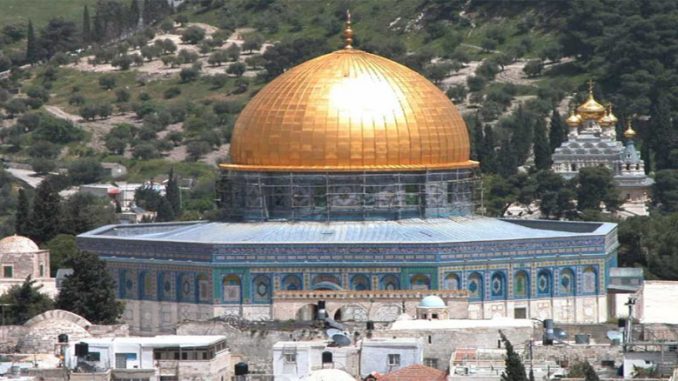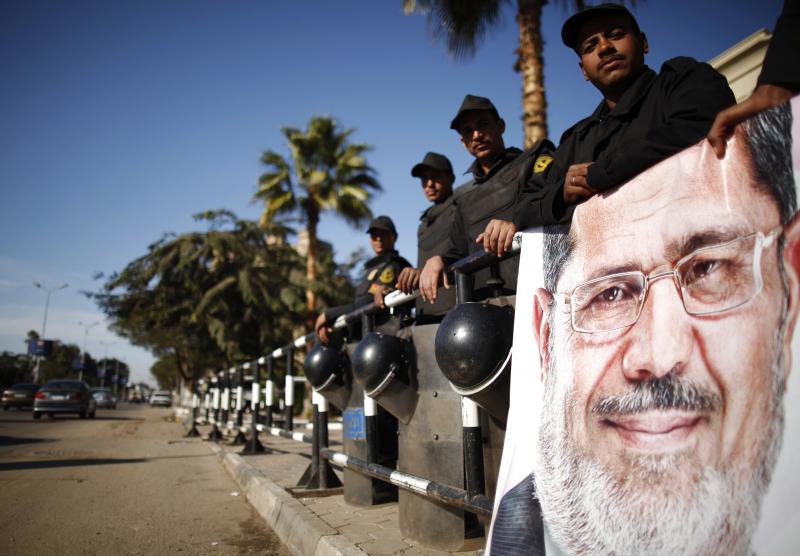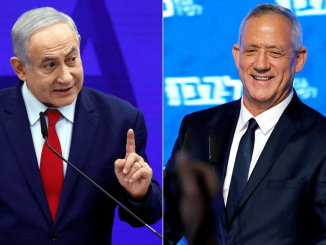
While Egypt’s government was publicly condemning a US decision to recognize Jerusalem as Israel’s capital, a state intelligence officer was asking influential TV hosts in the country to persuade their viewers to accept it.
On Saturday, January, 6, 2018, NYT said that it had obtained audio recordings in which Ashraf al-Kholi, an intelligence officer, can be heard telling the hosts that Egypt, like its “Arab brothers, are denouncing this matter”, but that “after that, this thing will become a reality”-
“Palestinians can’t resist and we don’t want to go to war,” Al-Kholi said, and added “We have enough on our plate as you know.”
US President Donald Trump recognized Jerusalem as Israel’s capital on December 6 and said that he was beginning the process of moving the US embassy to the city.
The move prompted widespread condemnation from many leaders throughout the Middle East, including Egypt, as well as the United Nations.
While Abdel-Fattah al-Sisi said that his country regretted Trump’s decision, which “will complicate the peace process,” in fact, Egypt’s relations with Israel are based on military and intelligence interests away from the Palestinian issue or Jerusalem’s status, according to Haaretz.
Last year, local Egyptian outlets reported that Egypt’s intelligence agencies were behind a takeover of several media groups and advertising agencies in a bid to manipulate the Egyptian public opinion.
How is Jerusalem different from Ramallah?
Ashraf Al-Kholi made the phone calls to three well-known Egyptian talk show hosts, as well as an Egyptian actress, according to a NYT report.
Kholi reportedly suggested to the hosts that the Palestinians should be happy with the occupied West Bank city of Ramallah, home to the Palestinian Authority.
“How is Jerusalem different from Ramallah, really?” Kholi said in the four recordings, according to the New York Times, suggesting that it could be an alternative to Jerusalem.
“Concessions are a must and if we reach a concession whereby Jerusalem will be – Ramallah will be the capital of Palestine, to end the war and so no one else dies, then we would go for it.”
The four calls Al-Kholi made with prominent media figures were as follows:
1) The first call was made to TV host Azmi Megahed, who confirmed the conversation with Kholi to US NYT. “The important thing is that we support the Palestinian people and end its suffering,“ Al-Kholi told Megahed, adding that regarding the Jerusalem decision, “What is the difference between Jerusalem and Ramallah – as a capital for Palestine?” Kholi also asked Megahed to tell viewers that “Tamim and Qatar have secret relations with Israel.”
2) Another call was with Mofid Fawzy, who the newspaper said denied that a conversation with Kholi had taken place. “There is a wave of condemnation that we support. We are denying the decision – on Jerusalem – like all our Arab brothers. But the matter will be done without even a decision. As a matter of fact, they (Israelis) have control on the ground,” Ashraf Al-Kholi told Fawzi, adding that, “We should focus on ending the suffering of Palestinians, no difference between Jerusalem and Ramallah – as capital of Palestine.” “… The idea of the deal of the century is to introduce a final solution for the Palestinian cause … We fear that an uprising breaks out and Haneyeh finds a role to play there; we want Hamas out of the game completely,” Kholi said, adding that “I’m talking with you to agree on how the media could convey this message to the public opinion – that there is no difference between Jerusalem and Ramallah. The most important thing is to end the suffering of the Palestinians.”
3) A third call was reportedly with Said Hassasin, a TV host and Member of Parliament. According to available scripts of leaked audios, Kholi said addressing Hassasin on the phone, “I’m calling to inform you about the trend of the Egyptian national security on the issue of recognizing Jerusalem as capital of Israel: First we codemn the decision like others. Then, we show that Palestinians cannot resist the decision, and we have no intention to enter a war…However, any intifada (uprising) is not in our favor. It is in favor of the Islamists, specifically Hamas which could be reproduced again. .. We see that things should be solved only through negotiations between Arab leaders and Trump. In the end, there will be no difference between Ramallah and Jerusalem; we should only end the suffering of the Palestinian people.”
4) The fourth call was with Egyptian singer and actress Yousra. “The trend is that we condemn (Trump’s decision) as everyone is doing. It is all about the decision that Jerusalem will be the capital of Israel … Actually, it will become a reality that we cannot do anything about … The basic issue Is ending the suffering of the Palestinian people completely. And what was agreed upon before is that which is being carried out now, Al-Kholi told Yousra.
Kholi called the reaction to the US Jerusalem decision “dangerous” and an “intifada issue”. “An intifada would not serve Egypt’s national security interests because an intifada would revive the Islamists and Hamas,” Kholi said.
Egypt condemnation
Like most countries across the region, Egypt quickly condemned Trump’s decision on Jerusalem. Prior to the official US announcement, Egyptian President Abdel Fattah Al-Sisi cautioned Trump against “taking measures that would undermine peace in the Middle East”.
Sheikh Ahmed al-Tayeb, a prominent Egyptian leader and imam of Cairo’s al-Azhar Mosque, said he declined a meeting with US Vice President Mike Pence to protest the US decision, according to Reuters news agency.
The leader of Egypt’s Coptic Church also cancelled a previously scheduled meeting with Pence.
Egypt also submitted a resolution to the UN Security Council, rejecting the establishment of diplomatic missions to Jerusalem. The resolution was vetoed by the US, but a similar non-binding version was adopted by the General Assembly.
Prior to the decision, relations between Egypt and Israel appeared to be warming. Sisi met Israeli Prime Minister Benjamin Netanyahu for the first time in public in September.
The two countries have cooperated on security issues in Egypt’s Sinai desert, where allies of the Islamic State of Iraq and the Levant (ISIL, also known as ISIS) armed group have ramped up deadly attacks in recent years.
Egypt’s SIS denies
On Sunday, Egypt denied the newspaper’s report that it had asked local media to play down opposition to Trump’s decision.
A statement by Egypt’s State Information Service said Sunday, “Egypt’s positions are conveyed by the president, the foreign minister and in official statements.”



